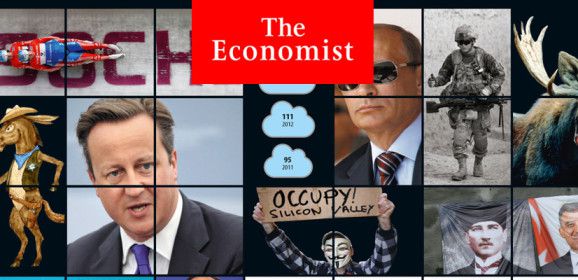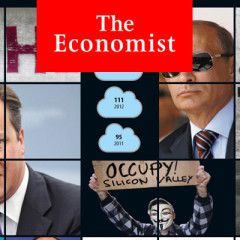Section: The Economist (The United Kingdom)
Ukraine at war: Fight club
Let’s stop shooting, shall we? WHAT can you say to the families of the many people killed during Ukraine’s month-old “ceasefire”? At least 331 Ukrainian soldiers and civilians have died since September 5th, when the government and the rebels agreed to stop fighting. Among the dead were a Donetsk teacher caught in shelling and Laurent...
Russia’s economy: On the edge of recession
SIGNS of Russia’s economic problems appeared long before the annexation of Crimea or the war in the Donbas region in Ukraine. The country’s previous growth model, in which profits from oil and gas sales were funnelled into the consumer economy, petered out around the time Vladimir Putin returned to the presidency in 2012. But Mr Putin...
Rebel areas in Ukraine: Significant variations
The territory controlled by pro-Russian rebels in the Donbas region of Ukraine has varied significantly. By early July they held large parts of Luhansk and Donetsk, but they were then driven back by the Ukrainian armed forces. They lost more ground after the shooting down of Malaysia Airlines flight MH17. In late August Russian forces crossed the...
Ukraine in turmoil: A Somalia scenario?
WITH violence in eastern Ukraine waning (for the moment), attention has tentatively turned to the country’s post-war contours. Both the government in Kiev and the separatists claim to be withdrawing heavy weaponry, following an agreement on September 20th to create a 30km (19 miles) buffer-zone, though clashes have continued in some places....
Ukraine and Russia: Win some, lose more
HISTORIANS will struggle to put dates on Russia’s murky war against Ukraine. It had no official start and no formal end. Russia never admitted that it was in the conflict, which it fanned and fought both directly and through proxies, so has not celebrated victory as it did after the annexation of Crimea. Ukraine never formally declared...
Charlemagne: Europe’s ring of fire
IT SEEMS safe to assume that Johnny Cash, born in Arkansas in 1932, gave little thought to European foreign policy. Yet one of the Man in Black’s better-known numbers sums up the European Union’s troubles with its neighbours. “Love is a burning thing,” he sang in “Ring of Fire”, a hit in 1963, “and it makes a fiery ring. Bound by wild...
Russia and Ukraine: A brief intermission
Time for a cigarette break, at least THE war in eastern Ukraine has quietened, for now. Its disparate factions have as much reason to keep fighting as to put away their guns. But a ceasefire signed on September 5th in Minsk is so far mostly holding. Ukraine’s president, Petro Poroshenko, does not want to fight an unwinnable war against...
Ukraine and Russia: War, not peace
THE war in Ukraine is intensifying, as Russia’s incursions into the east of the country become ever more brazen. On August 27th a column of Russian troops and equipment crossed the Russia-Ukraine border in the far south, at Novoazovsk, in an apparent attempt to open a new front outside the rebel-held areas and closer to Crimea....
Germany’s economy: Watching the wages
BLAMING Germany—or at least the austerity prescribed for the euro zone by Chancellor Angela Merkel—for Europe’s ills may be popular in France. But Germans are inclined, not without some pride, to see their economy as the strongest horse to pull the euro zone out of its misery. Hence the fear caused by a surprising update this month: real...
Serbia’s foreign policy: Divided loyalties
A NICE summing-up of Serbia’s foreign-policy dilemmas was shown in a recent drawing by Corax, the country’s leading political cartoonist. Aleksandar Vucic, Serbia’s prime minister, is shown playing two pianos at once, with Angela Merkel, Germany’s chancellor, conducting on one side, and Vladimir Putin, Russia’s...



